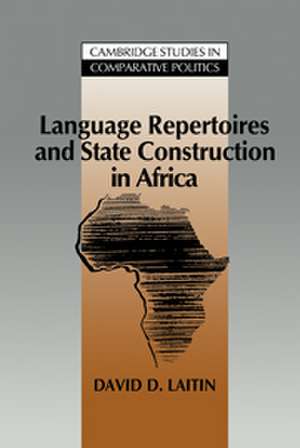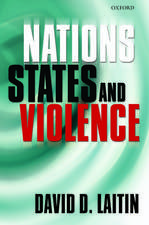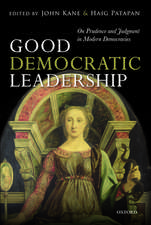Language Repertoires and State Construction in Africa: Cambridge Studies in Comparative Politics
Autor David D. Laitinen Limba Engleză Paperback – 17 ian 2007
| Toate formatele și edițiile | Preț | Express |
|---|---|---|
| Paperback (1) | 282.48 lei 6-8 săpt. | |
| Cambridge University Press – 17 ian 2007 | 282.48 lei 6-8 săpt. | |
| Hardback (1) | 743.36 lei 6-8 săpt. | |
| Cambridge University Press – 23 apr 1992 | 743.36 lei 6-8 săpt. |
Din seria Cambridge Studies in Comparative Politics
-
 Preț: 233.13 lei
Preț: 233.13 lei -
 Preț: 267.61 lei
Preț: 267.61 lei -
 Preț: 239.36 lei
Preț: 239.36 lei -
 Preț: 185.64 lei
Preț: 185.64 lei -
 Preț: 160.82 lei
Preț: 160.82 lei -
 Preț: 206.52 lei
Preț: 206.52 lei - 9%
 Preț: 594.68 lei
Preț: 594.68 lei -
 Preț: 225.70 lei
Preț: 225.70 lei -
 Preț: 164.94 lei
Preț: 164.94 lei -
 Preț: 206.71 lei
Preț: 206.71 lei -
 Preț: 236.42 lei
Preț: 236.42 lei -
 Preț: 358.38 lei
Preț: 358.38 lei -
 Preț: 231.82 lei
Preț: 231.82 lei -
 Preț: 257.82 lei
Preț: 257.82 lei -
 Preț: 264.74 lei
Preț: 264.74 lei -
 Preț: 269.58 lei
Preț: 269.58 lei -
 Preț: 201.24 lei
Preț: 201.24 lei -
 Preț: 232.45 lei
Preț: 232.45 lei -
 Preț: 203.42 lei
Preț: 203.42 lei -
 Preț: 191.12 lei
Preț: 191.12 lei -
 Preț: 158.77 lei
Preț: 158.77 lei -
 Preț: 199.05 lei
Preț: 199.05 lei -
 Preț: 288.80 lei
Preț: 288.80 lei -
 Preț: 388.29 lei
Preț: 388.29 lei -
 Preț: 288.04 lei
Preț: 288.04 lei - 11%
 Preț: 695.06 lei
Preț: 695.06 lei - 11%
 Preț: 553.80 lei
Preț: 553.80 lei -
 Preț: 262.06 lei
Preț: 262.06 lei - 11%
 Preț: 691.66 lei
Preț: 691.66 lei -
 Preț: 228.00 lei
Preț: 228.00 lei -
 Preț: 385.28 lei
Preț: 385.28 lei -
 Preț: 312.89 lei
Preț: 312.89 lei -
 Preț: 224.44 lei
Preț: 224.44 lei -
 Preț: 287.07 lei
Preț: 287.07 lei -
 Preț: 251.27 lei
Preț: 251.27 lei -
 Preț: 313.70 lei
Preț: 313.70 lei -
 Preț: 277.38 lei
Preț: 277.38 lei -
 Preț: 423.79 lei
Preț: 423.79 lei - 11%
 Preț: 552.94 lei
Preț: 552.94 lei - 11%
 Preț: 554.43 lei
Preț: 554.43 lei - 14%
 Preț: 783.26 lei
Preț: 783.26 lei - 11%
 Preț: 584.04 lei
Preț: 584.04 lei -
 Preț: 228.60 lei
Preț: 228.60 lei
Preț: 282.48 lei
Nou
Puncte Express: 424
Preț estimativ în valută:
54.06€ • 58.70$ • 45.41£
54.06€ • 58.70$ • 45.41£
Carte tipărită la comandă
Livrare economică 22 aprilie-06 mai
Preluare comenzi: 021 569.72.76
Specificații
ISBN-13: 9780521033275
ISBN-10: 0521033276
Pagini: 220
Dimensiuni: 151 x 229 x 14 mm
Greutate: 0.33 kg
Ediția:Revised
Editura: Cambridge University Press
Colecția Cambridge University Press
Seria Cambridge Studies in Comparative Politics
Locul publicării:New York, United States
ISBN-10: 0521033276
Pagini: 220
Dimensiuni: 151 x 229 x 14 mm
Greutate: 0.33 kg
Ediția:Revised
Editura: Cambridge University Press
Colecția Cambridge University Press
Seria Cambridge Studies in Comparative Politics
Locul publicării:New York, United States
Cuprins
Preface; Part I. Language Repertoires and the State: 1. Language repertoires as political outcomes; 2. Three theories explaining language outcomes; 3. Do language outcomes matter?; Part II. Sociological and Political Forces Described: 4. The micro dynamics of language use in contemporary Africa; 5. Macro forces shaping the contemporary language situation in Africa; Part III. Strategic Theory Applied: 6. Strategic theory and Africa's language future; 7. Case studies from independent Africa; Part IV. Conclusion and Policy Recommendations: 8. Shaping the 3 + 1 language state; Notes; References; Index.
Recenzii
"David Laitin has combined an erudite discussion of contemporary language conditions in Africa (and India) and an elegant analysis of the oppositions and dilemmas of language-reform policy, all in one slim and highly readable volume." Abram de Swann, Contemporary Sociology
"[S]ociolinguists, language planners, and those generally interested in language in Africa will find Laitin's approach an important tool for the analysis of those linguistically complex states in which multilingualism is the norm....Well researched and lucidly written, this volume abounds with detail on individual language situations, and is therefore valuable as a general overview of the continent....Potential readers from disciplines other than Laitin's own should not be daunted by the fact that Language Repertoires and State Construction in Africa is part of a political science series. The study is well conceived and contributes much to a relatively understudied field." Fiona McLaughlin, Anthropological Linguistics
"...represents a new and unique analysis of multilingualism in Africa. From his perspective as a political scientist, Laitin brings an enlightening interdisciplinary approach to this subject matter, which has traditionally been the domain of the linguist and the sociologist, and the so-called 'language planners'....I found Laitin's book to be remarkably enlightening. I feel that part of its significance lies in his demonstrated ability to provide a theoretical framework through which historians, political scientists, developmental economists, and other (non-linguistic) social scientists can become more aware of the great importance of multilingualism and 'language outcomes' as factors to be reckoned with in post-colonial Africa. He succeeds admirably at making us cognizant of a wide range of considerations demonstrating the importance that traditionally underacknowledged 'language repertoires' play in African societies." John Hutchinson, International Journal of African Historical Studies
"...an elegant and compelling analysis of language politics and policy choice in Africa, by a long distance the most comprehensive undertaken in any field...In a mere 164 pages of text, Laitin sketches an amazingly comprehensive portrait. In its scope and succinctness, this comparative study is a model...a masterful analysis of one of the most important aspects of identity politics in Africa and elsewhere. It is must reading for all students of African politics, as well as those concerned with the comparative politics of cultural pluralism." Crawford Young, American Political Science Review
"[S]ociolinguists, language planners, and those generally interested in language in Africa will find Laitin's approach an important tool for the analysis of those linguistically complex states in which multilingualism is the norm....Well researched and lucidly written, this volume abounds with detail on individual language situations, and is therefore valuable as a general overview of the continent....Potential readers from disciplines other than Laitin's own should not be daunted by the fact that Language Repertoires and State Construction in Africa is part of a political science series. The study is well conceived and contributes much to a relatively understudied field." Fiona McLaughlin, Anthropological Linguistics
"...represents a new and unique analysis of multilingualism in Africa. From his perspective as a political scientist, Laitin brings an enlightening interdisciplinary approach to this subject matter, which has traditionally been the domain of the linguist and the sociologist, and the so-called 'language planners'....I found Laitin's book to be remarkably enlightening. I feel that part of its significance lies in his demonstrated ability to provide a theoretical framework through which historians, political scientists, developmental economists, and other (non-linguistic) social scientists can become more aware of the great importance of multilingualism and 'language outcomes' as factors to be reckoned with in post-colonial Africa. He succeeds admirably at making us cognizant of a wide range of considerations demonstrating the importance that traditionally underacknowledged 'language repertoires' play in African societies." John Hutchinson, International Journal of African Historical Studies
"...an elegant and compelling analysis of language politics and policy choice in Africa, by a long distance the most comprehensive undertaken in any field...In a mere 164 pages of text, Laitin sketches an amazingly comprehensive portrait. In its scope and succinctness, this comparative study is a model...a masterful analysis of one of the most important aspects of identity politics in Africa and elsewhere. It is must reading for all students of African politics, as well as those concerned with the comparative politics of cultural pluralism." Crawford Young, American Political Science Review
Descriere
David Laitin addresses the problem of language planning in Africa and the role of language politics in the process of state formation.












